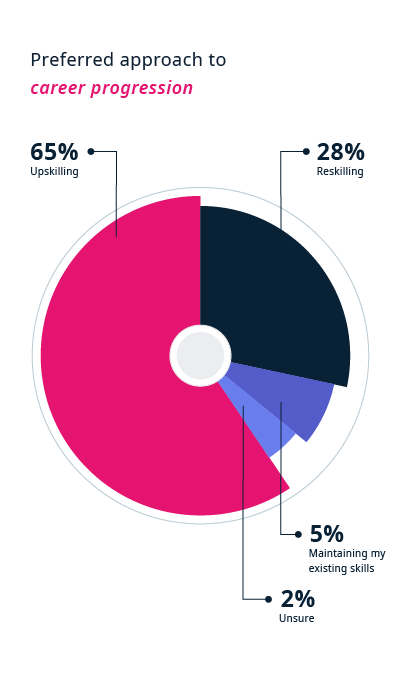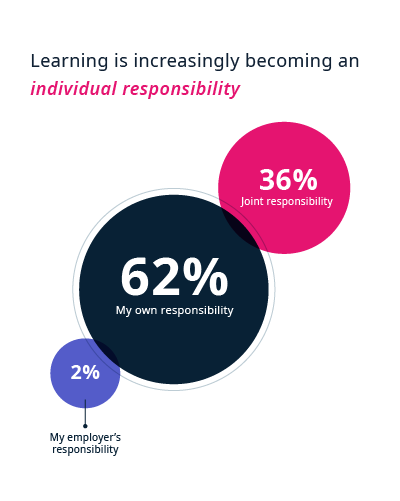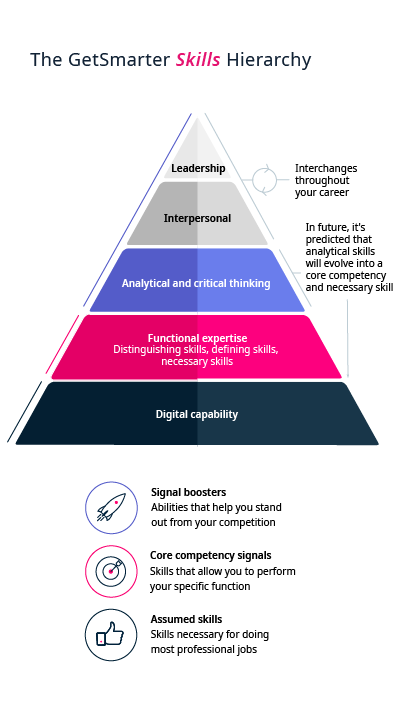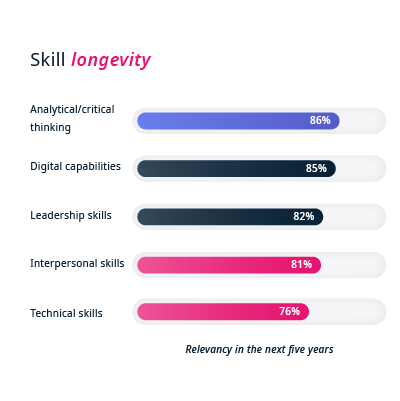Level Up: Why Digital Transformation Calls for New Skills
The first piece in this two-blog series investigated how digital transformation means different things to different people, and examined the dramatic impact that digital technology is having on organizations today. In part two, you’ll learn how people of all ages are equipping themselves to meet this challenge and opportunity, and discover which in-demand skills can help you better prepare for the future.
How to future-proof your career against disruption
According to a recent GetSmarter survey, 59% of professionals are likely to change their job in the next 6–12 months. This is linked to the global pandemic and the rise of technology, which our respondents said were the top two factors expected to cause disruption in the next two years.
COVID-19 has led people around the world to reexamine their priorities and rethink the way they work. With the option of working from home, many employees are considering leaving their employer in what has been labeled ‘the great resignation’.1
The majority of our survey respondents also said they were very comfortable with change, which may be the reason why career paths are becoming increasingly non-linear. Our research found that professionals expect to work longer, specifically older generations.
More than ever before, people have the option to evolve their skill set and pivot their careers. And digital transformation is the enabler spurring this on.
Upskill to stay relevant
Disruption has started to extend beyond just career paths and working methods, it’s now causing jobs themselves to hybridize. GetSmarter’s 2020 The Future of Work Is Here report revealed that professionals are choosing to combine their traditional skills with technical expertise, making them resistant to automation and highly in-demand. Thanks to user-friendly data analysis platforms and digital tools, people can now augment their critical thinking and leadership skills with technical knowledge.
With a new influx of remote and digital working opportunities, longer lifespans, and hybrid roles, professionals no longer have to stick to their chosen career path. But reinvention requires upskilling. In a landscape that’s characterized by transformation, continuous learning now needs to be embedded within your work ethos. In this Great Career Reset blog post, you’ll see how professionals are pivoting from a career plan to a skills plan. As jobs begin to adapt and react to technology’s presence, digital transformation initiatives will start to have more of an impact on employees’ day-to-day lives. Until now, industries have been revolutionizing as technology shapes their futures, but individuals are yet to feel the same kind of disruption in their work at a granular task level. The change, however, is fast approaching.
GetSmarter’s findings show that 65% of professionals prefer to upskill, rather than entirely reskill. But when we examine this at a generational level, our data shows that 57% of C-Suite professionals are reskilling – the highest amount out of all seniority levels. So despite executives being the ones to drive digital transformation strategy, they’re feeling the gap within their skill set.

But beyond the C-Suite, the pressure to upskill is mounting for everyone: 58% of GetSmarter’s survey respondents expect they’ll need to learn new skills for their current job within the next six months. So despite individuals potentially not yet feeling the direct effect of technology and industry transformation, the majority of people realize that their skills will soon degrade and the only solution is to upskill more frequently.
Individuals have begun to take their careers into their own hands. In a 2020 GetSmarter report, 43% of respondents believed continuous learning was their own responsibility. A year later, the percentage has grown to 62%.

People would rather upskill of their own accord and feel that formal training provided by an employer is the least valuable source of upskilling for digital transformation.
Of the GetSmarter respondents surveyed, 70% listed online education as the most useful method for gaining digital skills.

Prioritize building these skills today
According to the GetSmarter Skills Hierarchy, which was built from insights gathered from more than 100,000 students over 12 years, digital capabilities are now assumed skills for every job and should act as the foundation of your tool kit.

GetSmarter asked respondents to rank the above set of skills based on which will have the greatest longevity in their career in the next five years. Our findings show that analytical skills will become core competencies for any professional. These skills also have the most longevity, followed by digital capabilities – the skills you need to make use of typical office software, such as Zoom and Google Docs. Technical skills, like software proficiency, programming languages, coding, or digital marketing capabilities, despite being highly relevant right now and for the future, have the least longevity – meaning they’ll need to be updated more frequently.
This reflects the importance of people within digital transformation. The ability to lead a workforce through transformative change is, in some ways, more important than having a technical skill set or the technology itself. And without analytical abilities, leaders will struggle to discern how to prepare their teams for disruption.

Adopt a digital transformation framework to adapt your skills for the future
In the survey, GetSmarter also mapped the usefulness of skills currently versus in the next three years. This is what was revealed:
Data skills:
- Advanced analytics skills will be more important than data analysis skills
- Data forecasting and digital security skills will both increase in value
Unlock the power of data in business. Browse a range of online courses for technical and non-technical professionals, as well as business leaders.
Interpersonal skills:
- Communication skills will decrease in usefulness compared to other interpersonal skills
- Emotional intelligence, creativity, and courage are key to coping with an uncertain future
Leadership and organizational change skills:
- Strategic thinking and planning, as well as change management, are top skills
- Cultural intelligence, helping you to work in diverse scenarios and teams, will rise in importance
Technological skills:
- Artificial intelligence (AI) and machine learning (ML) skills will increase by 50% in the next three years
- New technologies (blockchain, augmented, mixed, and virtual reality) are on the rise
- Systems integration will become a main focus in the future
Understand how blockchain and fintech could benefit your customers. Future-proof your business with one of these online courses.
Enhance your ability to drive change using artificial intelligence. Better understand the business applications of AI with an online short course.
These insights paint a picture of the current world and reveal how COVID-19 has shifted the way we work. Although there has been an increase in the amount (and the way) we communicate, we’re still not connecting with as many people as we used to due to remote work and siloed working.
The data also shows that as jobs hybridize so will workplaces, placing a bigger focus on strategy and leadership, especially as emerging technologies are increasingly adopted across industries.
Organizations such as Microsoft reflect this new working era. They’re moving towards a blended form of work, where some employees stay at home and others return to the office.2 Globally, many companies – small and big – are following suit. But separating the workforce of an organization like Microsoft, with 160,000+ workers around the world, is no easy task – this means that a digital transformation strategy similarly has to be split, accounting for both remote and office work.
Make your next career move with the help of GetSmarter’s Career Navigator Tool.
With so many shifts in the business landscape, do you have the change management skills to reach your digital transformation goals?
Based on the above insights, GetSmarter has created a Digital Transformation Skills Framework to help you plan for the future. This framework is interactive. Click on the different categories to see a detailed breakdown of the specific skills that are expected to be the most useful in the next three years.
At the core of the framework lies interpersonal skills, which will be essential to helping you navigate uncertainty, change, and instability effectively. You’ll be required to develop a holistic tool kit that draws on leadership and operational knowledge, as well as data and technological skills.
Digital transformation starts with you
It’s time to acknowledge the value, potential, and power of digital transformation for you, your business’s processes, and people. Before any strategy can be applied, you first need to understand what digital transformation means to your organization. What goals do you need to succeed and are you equipped to navigate the changes?
Digital transformation is about more than just optimizing business processes; it can help achieve career longevity, competitive advantage, and job efficiency. However, success in this realm demands the prioritization of your own professional growth and an ongoing commitment to upskilling across a variety of categories.
GetSmarter has a wide range of online courses to help you navigate digital transformation. Leaders can enhance their ability to drive change effectively and professionals of all levels can build the skills to remain relevant in a disruptive future.